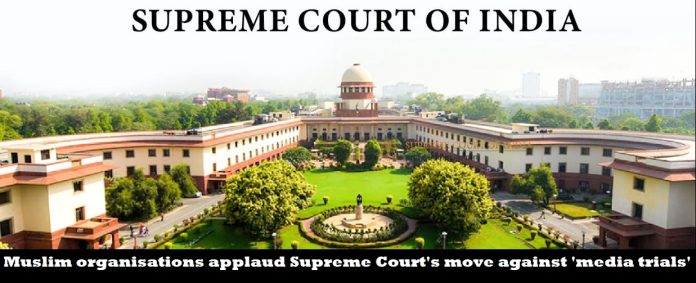– Anwarulhaq Baig
New Delhi, 18 Sep: The largest Muslim organizations of India, Jamaat-e-Islami Hind (JIH) and Jamiat Ulama-i-Hind have applauded the recent order of the Supreme Court, in which it directed the Ministry of Home Affairs (MHA) to frame guidelines within three months for press briefings by police during criminal investigations, with the intention to prevent them from becoming ‘media trials.’
Speaking to the Radiance, JIH Vice President Prof. Salim Engineer has lauded the order and reacted that it should have been taken earlier. Considering this a positive step, Prof. Salim has highlighted the potential for misuse of such press briefings, which can have a detrimental impact on the justice system. He highlighted how this practice of press briefings tarnishes an individual’s reputation by prematurely labeling an accused as a criminal before his conviction.
Describing it as an injustice with the accused, the JIH Vice President has cautioned that it creates obstacles in the pursuit of justice, potentially influencing the outcomes of cases. He has called for stricter control and regulation of this practice.
Coming down heavily on the ‘media trials’, a Bench of Chief Justice of India DY Chandrachud and Justices PS Narasimha and Manoj Misra on Sept. 13, 2023, asked the Ministry of Home Affairs (MHA) to frame guidelines within three months for press briefings by police in criminal cases.
Welcoming the order of the apex court against ‘media trials’, the Jamiat Ulama-i-Hind chief Maulana Arshad Madani pointed out that a section of media was spreading hatred between communities.
Responding to a question, Maulana Madani has reminded that the Constitution has granted every citizen the freedom of expression. However, he has emphasized that the freedom of speech does not grant permission to the media to engage in deliberate harassment or character assassination of minorities, particularly Muslims.
He added, “But in recent years, the continuous negative and biased reporting about Muslims by a section of media, especially electronic media, has posed a threat to the freedom and lives of Muslims. This clearly goes against the basic right to life as enshrined in the Constitution.”
Expressing his disappointment with the media’s tendency to act as judge and jury in cases involving Muslims, often portraying Muslim accused as criminals, Maulana Madani noted that the media remained silent when a Muslim accused was acquitted.
Appreciating the directives of Supreme Court to the MHA, Welfare Party of India (WPI) President Dr. SQR Ilyas said, “In many cases it is the media which make an innocent guilty in the eyes of the people before the pronouncement of the judgment. It is an established judicial norm that a person is innocent till proved guilty by the court of law. Even police leak incorrect information to media and on that half-truth and in most of cases sheer lies media makes a mountain out of a molehill.”
In its order, the apex court also called upon the Director Generals of Police (DGPs) from all states to provide their input and suggestions for these guidelines. The case will be further reviewed in the second week of January once the MHA prepares the handbook.
The National Human Rights Commission (NHRC) has also been instructed to contribute to it. To ensure objectivity, the court emphasized that police disclosures during media briefings should not result in a ‘media trial’. The SC issued this directive in response to a petition filed by the People’s Union for Civil Liberties (PUCL) related to police encounters.




